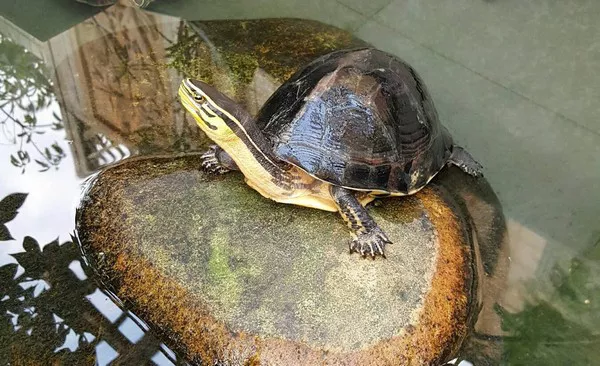Turtles, with their slow and steady demeanor, are fascinating creatures that require a well-balanced diet to thrive. While they are omnivores and enjoy a variety of foods, vegetables play a crucial role in their nutritional intake. In this comprehensive guide, we will dive into the world of turtle-friendly vegetables, exploring the options that provide essential vitamins, minerals, and fiber while ensuring the overall well-being of your shelled companion.
Understanding a Turtle’s Dietary Needs:
Turtles have specific dietary requirements that vary depending on their species. While some turtles are predominantly herbivorous, others may have a more omnivorous diet, incorporating both plant matter and protein sources like insects or small fish. It is essential to research and understand the specific dietary needs of your turtle species to provide them with a nutritionally balanced diet.
Nutritious Vegetables for Turtles:
- Leafy Greens:
Leafy greens are a staple in a turtle’s vegetarian diet, providing vital nutrients. Options such as kale, collard greens, dandelion greens, and mustard greens are excellent choices. These greens are rich in vitamins A, C, and K, as well as calcium and fiber, promoting healthy shell and bone development.
- Squash and Pumpkin:
Turtles often enjoy the mild flavor and soft texture of various squashes, such as butternut squash, acorn squash, and pumpkin. These vegetables are high in fiber and contain essential vitamins like vitamin A and vitamin C, supporting the overall health and immune system of your turtle.
- Bell Peppers:
Colorful bell peppers, including green, red, and yellow varieties, make an appealing addition to a turtle’s diet. Bell peppers are packed with antioxidants, vitamins A and C, and dietary fiber, providing a nutritious and crunchy treat for your shelled friend.
- Carrots:
Carrots are not only a favorite among humans but also a nutritious option for turtles. They are a good source of vitamin A, which is essential for healthy eyesight and a strong immune system. Remember to finely grate or chop the carrots into small, manageable pieces for your turtle.
- Zucchini and Cucumber:
Zucchini and cucumber are hydrating vegetables that turtles appreciate. These low-calorie options provide hydration, fiber, and vitamins, making them a refreshing and healthy addition to their diet. Slice them into small, bite-sized pieces for easy consumption.
- Broccoli and Cauliflower:
Broccoli and cauliflower offer a range of health benefits for turtles. Rich in vitamins C and K, as well as dietary fiber, these cruciferous vegetables contribute to strong immune systems, digestion, and overall well-being. Steam or blanch these vegetables before feeding to make them more easily digestible for your turtle.
- Turnip Greens:
Turnip greens are a leafy vegetable that turtles often enjoy. They are a great source of vitamins A and K, calcium, and folate, promoting healthy growth and development. Chop them finely or tear them into manageable pieces for your turtle to consume.
- Beet Greens:
Beet greens, the leafy tops of beetroot, are packed with nutrients. They contain vitamins A, C, and K, as well as calcium and iron. Offer beet greens as an occasional treat for your turtle, but avoid feeding them the beetroot itself, as it contains high levels of sugar.
Cautionary Notes:
While turtles can enjoy a wide variety of vegetables, it is essential to consider a few factors to ensure their well-being:
- Avoid Toxic Vegetables:
Some vegetables, such as onions, garlic, and mushrooms, are toxic to turtles and should be strictly avoided. Always research the suitability of a particular vegetable before introducing it into your turtle’s diet.
- Variety and Moderation:
Offering a diverse range of vegetables ensures a balanced diet for your turtle. Rotate the vegetables regularly to provide a mix of nutrients and prevent monotony. Remember that vegetables should only make up a portion of their overall diet, with protein sources and commercial turtle food also included.
- Organic and Pesticide-Free:
Whenever possible, choose organic vegetables to minimize exposure to pesticides or other harmful chemicals. Wash vegetables thoroughly before feeding them to your turtle, removing any dirt or residue.
Conclusion:
Including a variety of vegetables in your turtle’s diet is vital for their overall health and well-being. Leafy greens, squash, bell peppers, carrots, zucchini, broccoli, and other options offer a rich source of essential vitamins, minerals, and fiber. By providing a nutritionally balanced diet that caters to your turtle’s species-specific requirements, you are ensuring their longevity and vitality. Remember to research the dietary needs of your particular turtle species and consult with a reptile veterinarian for specific guidance. With the right combination of vegetables and other suitable foods, you can delight your shelled companion with a vegetarian feast that supports their thriving existence.
Related topics:

























